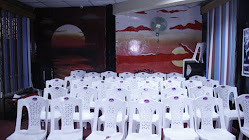Iman burhan's biography
"The epigraph that
began this chapter was my friend Burhan’s title for an Eastleighwood event he
wanted to host in Eastleigh, a promotional evening where businesses and their
proprietors could be promoted, and the reputation of Eastleigh enhanced by
showcasing its commerce and success, as opposed to its standard portrayal in
the media as a place of dubious money and terrorists. This event was not to be
as Burhan became sidetracked by other projects, but the idea behind it neatly
introduces entrepreneurial identity and values evident in Eastleigh. Whether
computer literate graduates with business diplomas like Burhan or the likes of
Yasmin of Garissa Lodge fame with little or no formal training in business,
Eastleigh’s businesspeople are seen by many as embodying the entrepreneurial
spirit.
Burhan himself
certainly embodies such a spirit, as his many different initiatives
demonstrate: a man of great energy, I would often tease him that whenever I met
him he had a new business. After studying for a diploma course, Burhan
worked at a Forex Bureau in central Nairobi, before his mother – who lives in
California – helped him with the capital to start up an electronics shop in
Jamia Mall, the Somali-owned mall next to Jamia Mosque, also in the city
centre. After that enterprise, he started both a cybercafé andIman
e-Business in Eastleigh, renting a shop on Jam Street for the former,
and an office in Garissa Lodge for the latter. The two businesses had a
symbiosis, as Iman e-Business made use of the cybercafé for
printing promotional material, and for establishing and maintaining its
website.
While running Iman
eBusiness, Burhan also established a media company called Waaberi Media
Limited, which produced a number of magazines designed especially for the
Somali diaspora: Burhan and his team of Somali youth told me they hoped the
magazine would prove popular from ‘Mogadishu to Minneapolis’. The articles in
the magazine very much had a Kenyan focus, however: the first issue including
an interview with the founder of the Eastleigh Business Association on the
history of Eastleigh. At Garissa Lodge, Burhan found his office becoming
something of a social club for a number of young Somalis, including some
talented singers. This led to Burhan and his entourage developing the idea
for Eastleighwood, the youth group which aims to harness these
talents through music, films and Eastleighwood Youth Forum, a
non-profit spin off registered as an NGO in Kenya.
In fashionable
terminology, Burhan would probably be classed as a ‘social entrepreneur’ in
his Eastleighwood initiative, as while it has given him the
chance to establish himself as an impresario for Eastleigh talents, and as an
events manager, the organisation does fulfil a drive to do some good derived
from his uncle’s legacy. His uncle – Ali Sharmarke – was a Canadian Somali who
returned to Mogadishu from Ottawa to co-found HornAfrik, a radio
station in Mogadishu which was targeted by Islamists, leading to the murder of
Sharmarke in 2007. This family link to someone so touched by conflict in
Somalia has left a strong mark on Burhan, especially as he respected his uncle
greatly. Burhan often speaks of securing his ‘legacy’, and that he sold
up his businesses in 2011 – after the eviction of Al Shabaab from Mogadishu –
to move temporarily to Somalia to establish an Eastleighwood office
there is testament to his bravery. Upon his return, Burhan and his team have
secured international backers for Eastleighwood, receiving funding
and equipment, now used on a number of productions, while they continue to
organise anti-radicalisation events in the estate.
It is interesting to
trace Burhan’s entrepreneurial influences, which resemble those of many other
Somalis and Kenyans operating in the Eastleigh economy and beyond. Burhan tells
of how key aspects of what he sees as essential ingredients of business success
– risk-taking and hard work – are values emphasised strongly by Somali culture.
Indeed, he told me of a Somali saying nin aan shaqeeysan shaah
macabo meaning ‘a man who does not work will not drink tea’,
suggesting that work is needed to enjoy life. A young friend of Burhan’s – a
Kenyan Somali from Mandera and fellow Eastleighwood pioneer – told me how his
father – now in Sweden – instilled a work ethic in him, demanding he succeed in
school. While his father used to send him money from Sweden, he now insists
his son works hard in Nairobi to contribute to his family’s well-being in
Mandera. This work ethic is not uniform in Eastleigh, however, and there exists
a strong stereotype of the Somali – and Oromo – who receives money from kin
abroad and spends time not working but chewing khat and relaxing. Indeed, the
image of the lazy chewer dependent on the hard work of others is a common
Somali trope in Eastleigh, and those seen as not working hard are criticised
for not meeting obligations.
Much of Burhan’s
inspiration comes from beyond Somali culture, however. He is very fond of
quotations drawn from his heroes from the world of business including Bill
Gates and Robert Kiyosaki, the American self-help author whose work includes
the Rich Dad series of books. There is a quotation from
Kiyosaki that he has posted on the Eastleighwood website that
resonates with Somali business values and the praise of risk and inda
adheeg: ‘Don’t let the fear of losing be greater than the excitement of
winning’. The work of Kiyosaki graces many a bookshop and roadside textbook
traders’ stall in Kenya, as the promise such books offer of riches draws in
many would-be entrepreneurs. Of course, such books are not limited to East
Africa, but are common throughout the world. Indeed, the spread of such
self-help books in Kenya mirrors the growth in self-help magazines in the
post-Soviet world designed to help people become neoliberal subjects and thrive
in the new economy.[1]
Burhan and a colleague
at Eastleighwood were especially fond of Kiyosaki’s ‘cashflow quadrant’,[2] whereby
employees and small businesspeople are contrasted with investors and large
scale businesspeople. While the former two seek security, true freedom and
wealth comes for the latter who allow their money to work for them. Burhan
compared this with what he described as a Somali dislike of working for
others: Somalis always wants to be her or his own boss. As another Somali
put it: ‘The main problem with Somalis is that they all want to give orders but
none want to follow’. Burhan reckoned even some of his own Somali employees
resented him for having power over them and curtailing their freedom. There is
cultural depth to such notions, and Simons describes how the pastoralist
heritage of Somalis has made them contemptuous of ‘dirty’ work such as agricultural
labour, giving them a ‘preference for management over production or hands-on
maintenance’.[3]"
Subscribe to:
Post Comments
(
Atom
)




















No comments :
Post a Comment